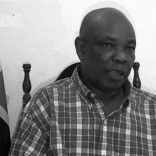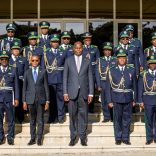Mozambique: President unveils plan to build 97 court buildings, 10 prisons by 2029
Cabo Delgado: São Tomé calls for greater involvement of international community to fight terrorism

Screen grab: United Nations
At the United Nations on Wednesday, President of São Tomé and Príncipe, Evaristo Carvalho, called for “greater involvement by the international community” in combating the “macabre actions of terrorism” in Cabo Delgado, northern Mozambique,
“We express our apprehension and concern about the resurgence of violence in the Mozambican province of Cabo Delgado and we call for greater involvement of the international community in combating the macabre actions of terrorism in this part of the Mozambican territory,” he said in the recorded speech sent to the general debate of the 75th UN General Assembly, the first to take place in virtual mode.
The province of Cabo Delgado has been the scene of armed attacks for three years by forces classified as terrorists. The violence caused a humanitarian crisis with more than a thousand deaths and some 365,000 internally displaced.
Evaristo Carvalho also called for “a definitive solution to the long negotiation process” to be found in the dispute between Morocco and Western Sahara.
“The eternal issue of Western Sahara continues to be a concern for us, and demands greater involvement from all of us in the search for a definitive solution to this long negotiating process,” the São Tomé and Príncipe head of state said, reiterating his country’s request for the parties “to resume negotiations with a view to reaching a mutually acceptable political solution”.
He also condemned outbreaks of conflict “with large-scale humanitarian repercussions all over the planet”, referring, in this context, to the “persistence” of the political-military conflict in the Central African Republic, Democratic Republic of Congo, South Sudan and Libya.
He condemned the actions of terrorist groups in the Sahel, the extremist al-Shabab group in East Africa and Boko Haram in Central and West Africa.
The “unfair” commercial and financial embargo against Cuba, the Israel-Palestine hostilities, and the conflicts in Syria and Yemen were also criticised by the Sao Tomean head of state.
The Sao Tome president defended multilateralism as the best way to “overcome the great challenges facing the world”, taking as an example the health crisis caused by the Covid-19 pandemic.
“It is our belief that multilateralism is the most appropriate way so that, in a joint effort, we can all together tackle the effects of the economic and financial situation imposed by the covid-19 pandemic,” said the Sao Tome head of state.
Evaristo Carvalho said that multilateralism “proved that, thanks to the combination of efforts and solidarity at the international level, it has been possible to overcome the harmful [worst] effects of it on an international scale”.
The head of state appealed to the UN to “not lose sight” of the fight against poverty, which he classified as “the greatest scourge of humanity”.
For the São Toméan president, poverty is “the main cause of hunger, land degradation, unbridled exploitation of natural resources, armed conflicts, displacement of populations and migratory flows that continue to take lives”.
The Sao Tome head of state reaffirmed his country’s “attachment” to “renewed multilateral cooperation at the service of the people, as well as a more sharp, supportive and effective multilateralism, both in combating the effects of poverty and in maintaining peace and international security, an indispensable condition for an inclusive and sustainable development”.
“The persistence of violent extremism demands our attention, but it must not absorb it to the point of ignoring challenges so important that they fight against our human existence, challenges addressed in the Sustainable Development Goals, such as poverty, climate change and maritime piracy.”
Evaristo Carvalho recalled the “incalculable benefits, both at the health and socio-economic levels” of the SGs and praised the “wave of solidarity” that São Tomé and Príncipe had benefited from, “at bilateral and multilateral levels”.
For the government official, the support of the international community to fight the Covid-19 pandemic had “ruled out the possibility of an eventual catastrophe”.
Evaristo Carvalho recalled the “devastating effects” of the pandemic on the economies of fragile countries and particularly on São Tomé and Príncipe, a small island state, calling on partners to continue “observing the spirit of solidarity and support for the post-Covid-19 economic recovery process, which will in all likelihood be very difficult”.
He also appealed for the need to “accelerate” the United Nations reform process as a way of giving the organization “greater dynamism, better representativeness, effectiveness, capacity and legitimacy in actions leading to the maintenance of international peace and security”.













Leave a Reply
Be the First to Comment!
You must be logged in to post a comment.
You must be logged in to post a comment.